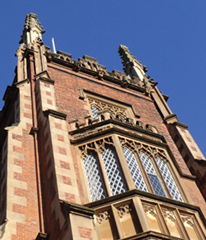Further and higher education overview
 Latest figures show a slight increase in higher education enrolment levels in Northern Ireland.
Latest figures show a slight increase in higher education enrolment levels in Northern Ireland.
Northern Ireland’s four higher education institutions consist of the University of Ulster, Queen’s University Belfast and two teacher training colleges (Stranmillis University College and St Mary’s University College).
The province has six further education institutions: Belfast Metropolitan College; Northern Regional College; South Eastern Regional College; Southern Regional College; South West College; North West Regional College. The College of Agriculture, Food and Rural Enterprise (CAFRE), which provides further and higher education courses, caters for the agri-food industry.
Higher education applications for this academic year (including CAFRE but not St Mary’s University College) showed a 0.3 per cent increase on last year, from 22,193 to 22,250.
There were 52,000 enrolments in Northern Ireland’s four higher education institutions during the 2010-2011 academic year, a 2 per cent increase on the previous year. Forty-nine per cent of these students were enrolled in the University of Ulster and 47 per cent in Queen’s. Each teacher training college had 2 per cent of higher education enrolments respectively.
Seventy per cent of enrolments were from full-time students and 30 per cent were part-time. Sixty-five per cent of enrolments were for first degree courses, 14 per cent for ‘other’ undergraduate courses (e.g. diplomas) while 22 per cent were for postgraduate enrolments. The 9,990 enrolments of full-time first year students represented a 7 per cent decrease on 2009-2010.
Total enrolments had increased by 10 per cent over the previous ten years. First degree enrolments saw the largest increase (17 per cent), followed by postgraduate enrolments (15 per cent). The number of enrolments in ‘other’ undergraduate courses, however, dropped by 17 per cent over this period. While full-time enrolments increased by 16 per cent, part-time numbers fell by 1 per cent.
Forty-six per cent of students studied STEM-related subjects in 2010-2011 and the most popular subject areas in higher education institutions were business and administrative studies, subjects ‘allied to medicine’, and education.
There were 155,425 professional and technical assessed enrolments in further education institutions during 2010-2011. 144,421 enrolments of these were in further education, while 11,004 were in higher education. Further education enrolments decreased by 5 per cent, while ‘higher education in further education’ enrolments dropped by 3 per cent on 2009-2010. 2010-2011 also saw 4,865 students from Northern Ireland enrolled in The Open University in Ireland.
During this financial year, the Department for Employment and Learning (DEL) is providing £356.1 million in funding for employment and skills, £209.4 million for higher education (including teacher training) and £193.6 million for student support and postgraduate awards. Capital spending on employment and skills totals £20.3 million, with a further £11.5 million going into higher education.
Higher education institutions are funded through a mixture of government funding and individual student contributions. Higher education in further education is funded through the further education funding mechanism, with agreed delivery targets. DEL finances recurrent and capital funding for the six further education colleges. Recurrent funding comes through a block grant, determined by volume of provision, departmental priorities, available funding and past performance.
The Programme for Government commits to an increase of 233 additional places in STEM courses this year, with 467 next year and 700 additional places in 2014- 2015. 23,930 students were enrolled in STEM courses in higher education institutions in 2010-2011. The programme also commits to delivering 211,000 qualifications among the working age population between 2011-2012 and 2014-2015.





